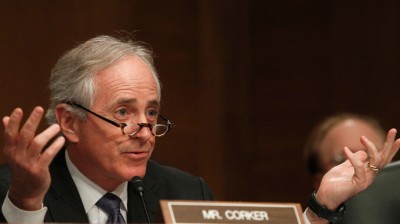US and EU Expand Economic Sanctions Against Russia

The United States and the European Union announced Friday an expanded package of sanctions against the Russian financial, energy, and defense sectors. The new measures were enacted as part of an ongoing campaign to place economic and military pressure on Russia, despite a continuing ceasefire in Ukraine between the Kiev regime and pro-Russian separatists in the east.
Banks affected by the new economic restrictions include Russia’s largest lenders Sberbank, Gazprombank and Rosselkhozbank. Western banks and individuals will be limited to purchasing short-term debt with a maturity of 30 days from five Russian financial firms.
Ivan Tchakarov, the chief economist for Citigroup in Russia, told the New York Times that the new limitations could lead to a major credit crunch at the end of the year when $25.1 billion in Russian foreign corporate debt matures.
The sanctions also limit Western funding to Russian defense companies Oboronprom, the United Aircraft Corporation, and Uralvagonzavon. Russian state-owned oil firms Rosneft, Transneft, and Gazpromneft will be subject to the new financing restrictions as well.
According to the Wall Street Journal the new round of sanctions are targeted at scuttling Russian Arctic and shale oil exploration projects by Exxon Mobil, BP, and Shell, partnering with Russian energy firms. The Western energy firms will be prohibited from providing technology and services to Russian energy corporation projects in the Arctic.
In addition to the economic sanctions, two dozen more Russian and Ukrainian citizens have been subject to a travel ban and asset freezes. Amongst those placed on the travel ban and asset freeze list was Alexander Zakharchenko, the Ukrainian leader of the Donetsk People’s Republic.
US Treasury Secretary Jack Lew released a statement in which he provocatively cited “Russia’s direct military intervention and blatant efforts to destabilize Ukraine” as justifications for the expanded economic sanctions.
The fighting in eastern Ukraine between Ukrainian armed forces and pro-Russian separatists has been used a pretext by the US and its European allies to increase economic and military pressure on Moscow.
Without presenting any convincing evidence, NATO and the US have repeatedly accused Russia of directly controlling the separatists and intervening in eastern Ukraine, recklessly raising the possibility of war between nuclear armed powers.
The imposition of a ceasefire and accompanying peace plan, worked out between Russian President Vladimir Putin and Ukrainian President Petro Poroshenko last week, has halted fighting in the Donbass region for the moment.
Putin dismissed the latest round of US and EU sanctions as ineffective, stating, “There are some things that are negative, but if we consider the problem in its totality, there is more positive than negative.” He stated that he found the new sanctions “odd” in the face of the peace plan. “Perhaps it is not to someone’s liking that the process has taken a peaceful turn,” he said.
Russian Foreign Minister Sergey Lavrov denounced the decision by the US and EU to impose new sanctions, saying, “We believe that taking such a decision in a time when the peace process is just becoming stable is in effect choosing the path to a derailment of the peace process.”
Poroshenko, speaking in Kiev on Friday at the Yalta European Strategy conference, hailed the expanded Western economic sanctions against Russia as a sign of unity and solidarity with Ukraine. Declaring that “Europe simply can’t be the European Union without Ukraine,” Poroshenko announced that Ukrainian and European parliaments would ratify an association agreement between the European Union and Kiev on Tuesday.
Ratification of the association agreement would move Ukraine further out of Russia’s economic sphere of influence and closer to EU member status. In a concession to Russia, European Commission president Jose Manuel Barroso announced that Ukraine could maintain current tariffs until early 2016.
Russia had threatened to block trade between Russia and Ukraine if trade barriers with Europe were dropped as stipulated in the original agreement. Other economic and political measures required by the association agreement would still go into effect immediately.
In February the United States and its European allies supported a far-right-wing coup that ousted former Ukrainian President Victor Yanukovych after he refused in late 2013 to sign the EU association agreement.
Also speaking at the Yalta European Security conference was Estonian President Toomas Hendrik Ilves, who took the opportunity to denounce and further antagonize Russia. Comparing Russia’s annexation of Crimea to Hitler’s seizure of the Sudetenland in 1938, Ilves described 2014 as an “annus horribilis” for Europe.
He placed blame on Russia for plunging the continent into the deepest crisis since World War II. Ominously Ilves declared that Russia was responsible for bringing Europe “back to 1648 and Hobbes’s war of all against all.”
Poroshenko will travel to Washington D.C. next week to meet with President Obama. He is expected to propose the creation of a military alliance with the US which sidesteps NATO as well seeking to developing closer economic ties with the US.
American military advisers have already been sent to assist in improving Ukraine’s military capabilities. The Defense and State departments have established a program to train and equip a battalion of the Ukrainian National Guard.

